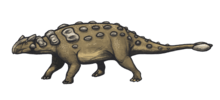Glyptodontopelta
| Glyptodontopelta Temporal range: Late Cretaceous, 69–66 Ma | |
|---|---|
| Scientific classification | |
| Kingdom: | Animalia |
| Phylum: | Chordata |
| Clade: | Dinosauria |
| Order: | †Ornithischia |
| Suborder: | †Ankylosauria |
| Family: | †Nodosauridae |
| Genus: | †Glyptodontopelta Ford, 2000 |
| Type species | |
| †Glyptodontopelta mimus Ford, 2000 | |
| Synonyms | |
| |
Glyptodontopelta (meaning "Glyptodon shield", a reference to the similarity of its pelvic armor to that of Glyptodon) is a genus of dinosaur from the Late Cretaceous. It was an nodosaur, an armored dinosaur.
Fossils of Glyptodontopelta, consisting only of bony armor, were found in the U.S. state of New Mexico. The type species, Glyptodontopelta mimus, was described by Tracy Lee Ford in 2000.[1] The holotype, USNM 8610, consists of three pieces of fused flat osteoderms, found in the Campanian-Maastrichtian Ojo Alamo Formation. It was concluded to be a dubious name, a nomen dubium, in a 2004 review of the Ankylosauria,[2] but a 2008 publication by Michael Burns concurred with Ford that its armor was distinctive enough to consider it valid. Burns also assigned Glyptodontopelta to Nodosauridae — rejecting Ford's Stegopeltinae — and proposed that another armored taxon from New Mexico, Edmontonia australis, is a synonym of Glyptodontopelta mimus, based on analysis of armor size and shape.[3]
See also
References
- ↑ T.L. Ford. (2000). "A review of ankylosaur osteoderms from New Mexico and a preliminary review of ankylosaur armor", In: S. G. Lucas and A. B. Heckert (eds.), Dinosaurs of New Mexico. New Mexico Museum of Natural History and Science Bulletin 17: 157-176
- ↑ Vickaryous, Matthew K.; Maryańska, Teresa; Weishampel, David B. (2004). "Ankylosauria". In Weishampel, David B.; Dodson, Peter; Osmólska, Halszka (eds.). The Dinosauria (Second ed.). Berkeley: University of California Press. pp. 363–392.
- ↑ Burns, Michael E. (2008). "Taxonomic utility of ankylosaur (Dinosauria, Ornithischia) osteoderms: Glyptodontopelta mimus Ford, 2000: a test case". Journal of Vertebrate Paleontology. 28 (4): 1102–1109. doi:10.1671/0272-4634-28.4.1102.

